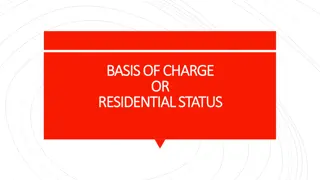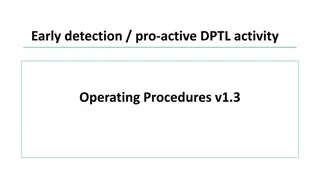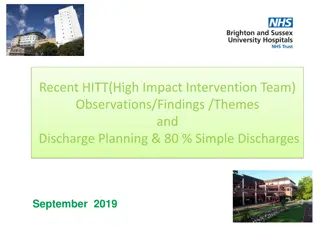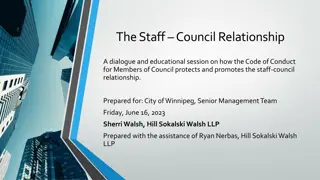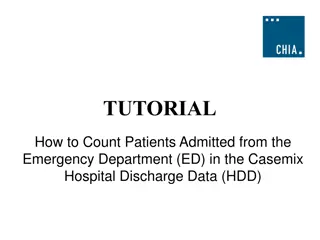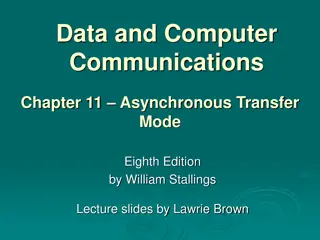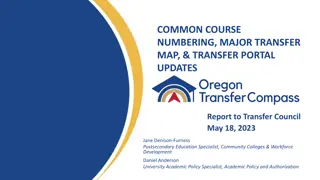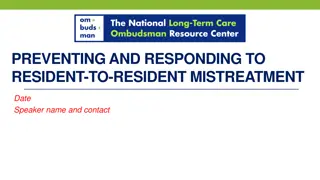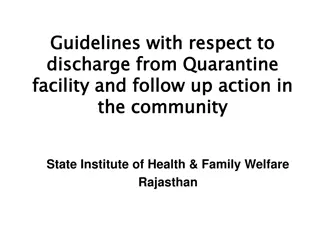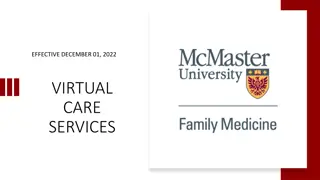Admission, Transfer, and Discharge Guidelines for Virtual Resident Family Action Council
Explore essential information on admission procedures, rights, services, and practitioner affiliations for Virtual Resident Family Action Council members. Understand the materials you should receive, refund and bed hold policies, assessments, and resident rights. Be informed before signing any agreements.
Download Presentation

Please find below an Image/Link to download the presentation.
The content on the website is provided AS IS for your information and personal use only. It may not be sold, licensed, or shared on other websites without obtaining consent from the author. Download presentation by click this link. If you encounter any issues during the download, it is possible that the publisher has removed the file from their server.
E N D
Presentation Transcript
VIRTUAL RESIDENT/FAMILY ACTION COUNCIL MARCH 21, 2022 ADMISSION, ADMISSION, TRANSFER AND DISCHARGE TRANSFER AND DISCHARGE Cynthia Rudder, Ph.D.
ADMISSION ADMISSION RIGHTS AND RIGHTS AND RULES RULES
The facility's policies and procedures upon request; For example: personnel policies ADMISSION: MATERIAL YOU SHOULD RECEIVE OR HAVE RECEIVED (415.3 and 415.26) Information on your right to live in the most integrated and least restrictive setting; Home and community-based services and community transition programs;
ADMISSION: MATERIAL YOU SHOULD RECEIVE OR HAVE RECEIVED (415.3 and 415.26) Rates and Services; Facility Complaint System;
Need for all practitioners to be affiliated with the facility and that your personal doctor or dentist may apply; ADMISSION: MATERIAL YOU SHOULD RECEIVE OR HAVE RECEIVED (415.3 and 415.26) You may seek a second opinion and may call a specialist selected by you for medical consultation (the facility is not required to pay);
ADMISSION: MATERIAL YOU SHOULD RECEIVE Refund policy if you leave; Bed hold policy if you go to the hospital or go out for therapeutic leave;
ADMISSION: MATERIAL YOU SHOULD RECEIVE OR HAVE RECEIVED (415.3 and 415.26) Your assessment, where you fall in the case mix system; Explanation of the case mix system if you request it;
ADMISSION: MATERIAL YOU SHOULD RECEIVE OR HAVE RECEIVED (415.3 and 415.26) The resident's rights and all rules and regulations governing resident conduct and responsibilities during the stay in the facility both orally and in writing in a method of communication that the individuals understand;
THINGS YOU NEED TO KNOW BEFORE SIGNING AN AGREEMENT CONTRACT As a family member you cannot be asked to be financially responsible unless you are a power of attorney and are using the resident s funds. You cannot be asked to donate to the home as a prerequisite for admission.
PRE-DISPUTE ARBITRATION AGREEMENTS Arbitration is a process in of one or more arbitrators who decide the outcome instead of a jury made up of members of the community. Pre- dispute arbitration means that the consumer must agree to arbitration before any dispute arises. Once signed, these agreements bar consumers from seeking legal action in court should they suffer harm or injury.
If you sign an arbitration agreement and are later hurt because the facility was negligent or even if you were intentionally injured by a staff member or fellow resident, you will NOT be able to hold the nursing home accountable in court. arbitration-fact-sheet-2020.pdf (theconsumervoice.org)
IF YOU DECIDED TO SIGN OR HAVE SIGNED: REQUIREMENTS OF PRE-DISPUTE ARBITRATION AGREEMENTS: MUST BE TRANSPARENT The agreement must be explained in a form and manner that you understand, including in a language that you understand; and require that you acknowledge that you understand the agreement. The agreement must not contain any language that prohibits or discourages the resident or anyone else from communicating with federal, state, or local officials, If you signed an arbitration agreement, you must be allowed to rescind (undo) the agreement within 30 days.
EXPERIENCES OF ADMISSION TO A NURSING HOME
ACTIONS YOU CAN TAKE IF YOU, AS A FAMILY MEMBER, ARE ASKED TO BE FINANCIALLY RESPONSIBLE AND YOU ARE NOT A POWER OF ATTORNEY
WHAT CAN YOU DO IF THE AGREEMENT ASKS YOU, AS A FAMILY MEMBER, TO BE FINANCIALLY RESPONSIBLE? If you do not have legal access to a resident's income or resources available to pay for facility care, you cannot be made financially responsible. If you find any line in the admission contract that indicates you, as a family member, agree to be financially responsible: CROSS IT OUT PUT YOUR INITIALS AND THE DATE
ACTIONS YOU CAN TAKE IF YOU ARE ASKED TO SIGN A PRE-DISPUTE ARBITRATION AGREEMENT AND YOU DO NOT WANT TO
WHAT TO DO IF YOU ARE ASKED TO SIGN A PRE-DISPUTE ARBITRATION AGREEMENT AND YOU DO NOT WANT TO SIGN? You have the right to refuse to sign. You cannot be denied admission or discharged for not signing. Above all, don t feel pressured to sign! You can always decide to seek arbitration later, after a dispute has occurred, if you decide it is in your best interests CROSS IT OUT PUT YOUR INITIALS AND THE DATE NEXT TO IT.
TRANSFER AND DISCHARGE 415.3
THREATENED WITH TRANSFER AND DISCHARGE You may be happier in another You may be happier in another facility, we ll start looking for facility, we ll start looking for another nursing home for you, another nursing home for you, Maybe our facility can t seem to Maybe our facility can t seem to meet your mother s needs and we meet your mother s needs and we need to find a facility that can. need to find a facility that can. You have to move out in three You have to move out in three days. days.
TRANSFER AND DISCHARGE RIGHTS:THERE ARE ONLY 6 REASONS YOU CAN BE DISCHARGED 1. The facility cannot meet your needs; 2. You no longer need nursing facility services; 3. Your presence endangers the safety of others in the facility; 4. Your presence endangers the health of others in the facility; 5. You (the resident) have failed to pay; or 6. The facility is closing.
IF YOUR HOME BELIEVES IT HAS GROUNDS FOR DISCHARGE It must give a written notice to the resident and resident s representative 30 days before transfer or discharge, except in cases where the resident is at risk of harming themselves or others, when the resident could be discharged earlier. In a language that the resident and representative understand.
the alleged reason for the discharge, THE NOTICE MUST INCLUDE: the planned discharge date, the location to which the resident will be transferred, an explanation of the resident s appeal rights,
THE NOTICE MUST INCLUDE: contact information for the State long- term care ombudsman program, a statement that the resident may represent him or herself or use legal counsel, a relative, a friend, or other spokesman,
an explanation that the resident may remain in the facility (except in cases of imminent danger) pending the appeal decision if the request for an appeal is made within 15 days of the date the resident received the notice of transfer/discharge*; and THE NOTICE MUST INCLUDE: if applicable, the agencies responsible for advocacy on behalf of persons with mental illness and developmental disabilities. *Federal regs say anytime before the discharge.
The law requires the nursing home to problem- solve the reason for discharge and make attempts to address the issue(s). IF YOUR HOME BELIEVES IT HAS GROUNDS FOR DISCHARGE A doctor must document the reason for discharge in your medical record. Residents can be transferred to another appropriate facility only after consultation, as appropriate, with the resident, his or her physician, and designated representative except in an emergency situation, in which case the operator shall notify the physician and designated representative immediately and record the reason for the transfer.
EXPERIENCES RELATED TO DISCHARGE OR TRANSFER
ACTIONS YOU CAN TAKE IF THREATENED WITH DISCHARGE AND YOU DO NOT WANT TO MOVE
ACTIONS YOU CAN TAKE IF THREATENED WITH DISCHARGE AND YOU DO NOT WANT TO MOVE Do not leave. Appeal within 15 days of the written discharge notice.** If you did not receive a discharge notice, call the Department of Health and ask to make an appeal. **Federal regulations permit you to appeal any time before a discharge.
RESPONSES TO FACILITY REASONS FOR DISCHARGE
If you have submitted paperwork for third party payment and payment status is pending, such as applying for Medicaid, the facility cannot discharge you for failure to pay. 1. YOU ARE TOLD YOU HAVE TO LEAVE BECAUSE THE FACILITY HAS RECEIVED NO PAYMENT A transfer or discharge for failure to pay shall be permissible only if a charge is not in dispute, no appeal of a denial of benefits is pending, or funds for payment are actually available and the resident refuses to cooperate with the facility in obtaining the funds.
In the absence of atypical changes in residents conditions, it should be rare that facilities who properly assess their capacity and capability of caring for a resident then discharge that resident based on the inability to meet their needs. ** 2. YOU ARE TOLD THE TRANSFER OR DISCHARGE IS NECESSARY FOR YOUR WELFARE: YOUR NEEDS CANNOT BE MET This is a legal reason only if your needs cannot be met in any nursing home Don t move Request a hearing Ask to see your care plan **(NYSDOH DAL-NH 19-07: 19-07_notice_of_transfer.pdf (ny.gov)). Except for specialized needs such as acute psychiatric, bariatric, or ventilator care, nursing homes are certified to provide similar types of care and services.
Remember: The facility must document the following in your record: YOU ARE TOLD THE TRANSFER OR DISCHARGE IS NECESSARY FOR YOUR WELFARE: YOUR NEEDS CANNOT BE MET The specific need(s) that allegedly cannot be met. What the facility has done to try to meet those needs. The specific services that available in the new facility that will supposedly meet your needs. DID THE FACILITY DO THIS? TAKE A LOOK AT THE CARE PLAN
TAKE A LOOK AT THE CARE PLAN YOU ARE TOLD THE TRANSFER OR DISCHARGE IS NECESSARY FOR YOUR WELFARE: YOUR NEEDS CANNOT BE MET Does the care plan indicate what needs cannot be met? Does the care plan indicate an attempt to deal with the issues? Does the care plan indicate alternative ways of dealing with the issues? Has your doctor or the facility s doctor signed? Does the care plan indicate that the how the new facility will meet your needs?
3. YOU ARE TOLD YOU ARE BEING DISCHARGED BECAUSE THE SAFETY OR HEALTH OF INDIVIDUALS IN THE FACILITY WOULD BE ENDANGERED. Does the care plan indicate that you are a threat to the safety or health of others and why? Has your doctor or the facility s doctor signed? Does the care plan indicate an attempts to deal with the issues? Does the care plan indicate alternative ways of dealing with the issues?
4. YOU MUST MOVE OUT BECAUSE YOU ARE TOO DISRUPTIVE Disruptive behavior is not equivalent to endangering the health or safety. May be a symptom of a condition.
5. YOU MUST MOVE OUT BECAUSE YOU ARE NOT COMPLIANT This is not a reason for discharge. The resident can refuse treatment. The Facility must make reasonable accommodations to address resident s preferences.
6. YOU MUST MOVE OUT BECAUSE YOU ARE TOO EXPENSIVE TO CARE FOR Facility is required to provide care to reach highest practicable level of well- being. Discrimination on basis of payment source (Medicaid) is prohibited
7. YOU MUST MOVE OUT BECAUSE YOUR MEDICARE COVERAGE HAS ENDED You can stay on Medicaid or pay privately
8. YOU MUST MOVE OUT BECAUSE YOU ARE TOO DIFFICULT Being difficult is not one of the 6 reasons permitted for discharge. Nursing homes are paid to care for people with many different physical and cognitive symptoms.
9. YOU MUST MOVE OUT BECAUSE YOU COMPLAIN TOO MUCH You can complain without retaliation
You have the right to: File an appeal to the New York State Department of Health within 60 days (The facility must help you if you need help.) APPEALING THE DISCHARGE OR TRANSFER MAKE THAT APPEAL WITHIN 15 DAYS OF THE DATE THAT YOU RECEIVE THE NOTICE OF TRANSFER/DISCHARGE AND YOU HAVE THE RIGHT TO REMAIN IN THE FACILITY (EXCEPT IN CASES OF IMMINENT DANGER) PENDING THE APPEAL DECISION Federal Rules: MAKE THE APPEAL ANYTIME BEFORE THE DISCHARGE AND YOU HAVE THE RIGHT TO REMAIN
You have the right to: APPEALING THE DISCHARGE OR TRANSFER A post-transfer hearing within 30 days of transfer if you did not request a hearing prior to transfer; if you win the appeal you will can return to the first available bed in the facility; and In cases of residents discharged/transferred due to imminent danger, the resident may return to the first semi-private available bed if he or she prevails at the hearing on appeal.
Call New York State Department of Health (NYS DOH) and state you are appealing the discharge. HOW TO APPEAL NURSING HOME DISCHARGE (Be specific it is the same # as the complaint hotline!) 1-888-201-4563 You can also fax or write to the Department of Health to request the appeal: Fax: 518-408-1157 Address: Department of Health Centralized Complaint Intake Program 875 Central Avenue Albany, NY 12206
NYS DOH will request a copy of the notice from the facility to review it for validity on its face . If notice is invalid, facility will be informed it cannot discharge resident APPEALING NURSING HOME DISCHARGE NYS DOH Bureau of Adjudication Sets the date/time/place of the hearing before an Administrative Law Judge (ALJ) Hearing will typically be where the resident is located.
The resident may be transferred only when the interdisciplinary care team, in consultation with the resident or the resident's designated representative makes that decision. WHAT HAPPENS WHEN YOU AGREE WITH THE DISCHARGE? The facility must permit the resident, their legal representative or health care agent the opportunity to participate in deciding where the resident will reside after discharge from the facility.
You have the right to return to the facility following hospitalization or therapeutic leave, including the right to return to your bed or the first available bed. Sending you to the hospital does not relieve the facility of the responsibility of following the discharge requirements if the facility refuses to take you back. RETURNING If the facility says that you cannot return, it must issue a discharge letter that gives all the notice requirements and you can appeal.
MEDICAID BED HOLD POLICY: FOR RESIDENT IN FACILITY FOR 30 DAYS OR MORE You may leave the nursing home for up to 10 days a year for therapeutic leave. The facility must reserve the same bed and room occupied before the leave of absence in this situation.
MEDICAID BED HOLD POLICY: FOR RESIDENT IN FACILITY FOR 30 DAYS OR MORE If your hospitalization or therapeutic leave exceeds the bed hold period you will be readmitted to the facility immediately upon the first availability of a bed in a semi-private room.
Call StateWides Patient Rights Helpline: RESOURCES 800-333-4374 Mobilization for Justice - (855) 444-6477 They will help with appeals for NYC only
Transfer and Discharge - Your Rights as a Nursing Home Resident in New York State and Nursing Home Responsibilities (ny.gov) RESOURCES nursing-home-discharges-final_- _8_2018.pdf (theconsumervoice.org)



